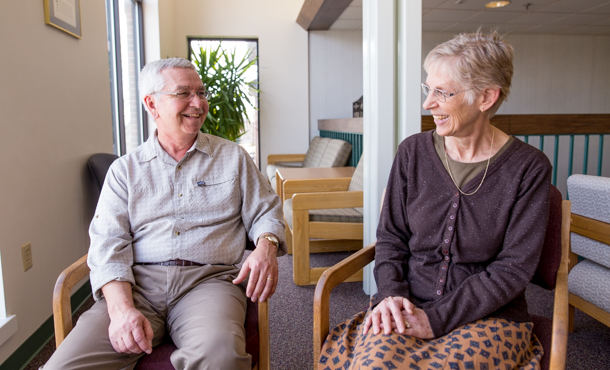Lonnie Yoder and Nancy Heisey have a shared problem—a good problem. Both love teaching, but they are also gifted at administration and seeing the big picture.
At Eastern Mennonite Seminary (EMS), both have received opportunities to engage the full range of their talents. Yoder, a professor at EMS since 1991, concluded six years as the seminary’s associate dean on June 15. Heisey, a faculty member in Eastern Mennonite University’s Bible and Religion Department since 1999, will take over the position Aug. 15 while continuing to teach.
“I’ve always felt that my primary calling is teaching, although it took me a long time to get to it,” says Heisey, who didn’t pursue her doctorate until she was in her forties. “But I feel like I have a really strong experience background in administration, so I’ll be working from that. My friends tell me one of my biggest problems is not saying no.”
Heisey is former president of Mennonite World Conference and spent 15 years in leadership at Mennonite Central Committee. She also served three years as undergraduate dean at EMU.
That journey, plus serving on many search committees over the years, underscored for her the importance of having women in the often male-dominated field of administrative leadership. The opportunity to bring that perspective to the seminary helped her to say yes when the call came.
Yoder is glad she did.
“I am delighted to see Nancy move into this role,” Yoder says. “To diversify the seminary leadership in this way, I’m delighted, and that it is Nancy adds to this delight because of the experience and leadership gifts she brings.”
Yoder continues part-time teaching
Yoder was half-time as associate dean and half-time teaching courses in pastoral care and counseling and leadership since 2010. He continues as part-time EMS faculty in 2016-2017, teaching two courses per semester. Some will be on campus and some will be hybrid courses or distance learning, a model he helped to pioneer at EMU. (“He’s been the face of distance learning at EMU for a long time,” says Heisey—who had Yoder for a class while completing her Master of Divinity at EMS.)
While he is eager to have more time “relishing the role of being a grandparent” and doing non-academic reading and additional congregational consulting work, Yoder has appreciated the experience of being associate dean.
“I have thoroughly enjoyed this work,” Yoder says. “I appreciate the diverse kinds of involvement required by the role. Any day is different. You never know what might come through the door or over the phone or by email. I’ve loved juggling all of that.”
A new team of administrators
Heisey, meanwhile, will spend three-eighths of her time in the seminary associate dean role after the transition, while continuing to teach about five courses per year with the remaining time. She already has been accustomed to balancing teaching with other tasks, as she has been serving as director of the EMU Core Program. She will swap that duty for the intriguing new seminary responsibilities.
“I enjoy getting creative,” Heisey says. “A curriculum is defined, but a lot of students’ lives are not that defined. It’s a challenge to uphold academic credibility but also take student needs into account. I like working on that.”
Heisey will also be joined by Michael King and Sue Cockley in a new deans’ team expected to actively link seminary and grad school programs. King, former vice president and seminary dean, will add to his portfolio leadership of the School of Graduate and Professional Studies. Cockley will be the graduate school associate dean.
Cohesiveness, responsive curriculum a ‘Gospel imperative’
Heisey’s joint responsibilities will also continue to strengthen the bridge between EMS, the Bible and Religion Department and the rest of the university, now a much more cohesive bond than in past decades. Yoder helped that process, serving as the first president of the newly formed Faculty Senate in 2006. The seminary has continued to be represented on that body ever since and has made other connections.
“We’ve come a long way,” Yoder says.
Looking ahead, both teacher-administrators see an important role for EMS even as the broader seminary world changes rapidly.
Yoder notes that recent hires have included two professors from the United Methodist Church–the seminary is an approved site for training of candidates for UMC ordination–and students represent a wide spectrum of voices and backgrounds.
“It’s important to maintain a distinct identity as a Anabaptist-Mennonite seminary and at the same time have a warm and broad embrace of the diverse individuals interested in theological education,” he says.
Curriculum will also have to change to meet the needs of new students, Heisey adds.
“I’m very convinced that what is going to be needed for church leadership going forward is not going to look like what it has looked like,” Heisey says. “The models are not bad models, but the world around us is shifting and changing dramatically, while academic structures tend to move very slowly. So let’s get creative! What do Gospel-oriented communities need in their leadership? How do we facilitate that?”
If anyone can do it, though, Heisey is convinced that EMU can.
“There are Gospel imperatives in which we are participating,” Heisey says. “This place is just really important.”
